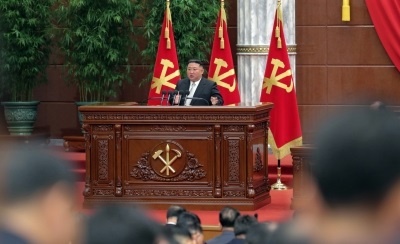Seoul, (Asian independent) North Korea called its failed attempt to launch a purported military reconnaissance satellite the “most serious” shortcoming in the first half of this year and reaffirmed its pledge to put it into orbit soon, Pyongyang’s state media said on Monday.
North Korea made the assessment following a plenary meeting of the 8th Central Committee of the ruling Workers’ Party of Korea, attended by leader Kim Jong-un, that wrapped up the previous day, referring to its botched attempt to launch a rocket carrying a military spy satellite on May 31, Yonhap news agency reported.
The “Chollima-1” rocket carrying a military reconnaissance satellite, “Malligyong-1”, took off from a new launch pad at the Sohae Satellite Launching Ground but crashed into the Yellow Sea following what Pyongyang claimed was the “abnormal starting” of the second stage engine of its space rocket.
“The most serious one was the failure of the military reconnaissance satellite launch, the important strategic work in the field of space development, on May 31,” the North’s Korean Central News Agency (KCNA) said in an English-language dispatch, citing the failure as among the “shortcomings that cannot be overlooked”.
The KCNA said that officials who were responsible for the launch were “bitterly” criticised and that an order was made to thoroughly analyse the cause of the failure to “successfully launch the military reconnaissance satellite in a short span of time and thus make a shortcut to improving the capabilities of the Korean People’s Army’s reconnaissance intelligence”.
Pyongyang has vowed to “correctly” put the satellite into orbit soon despite global condemnation that the move “breaches multiple UN Security Council resolutions banning any launch using ballistic missile technology”.
During the three-day meeting that discussed the regime’s defence and diplomatic strategies, the North made clear its push to increase the “production of powerful nuclear weapons” to counter the “changed security situation”.
“The complicated and serious situation on the Korean peninsula which is getting out of control requires the DPRK to ceaselessly renew its military potentials and make a faster advance toward the bolstering up of its capabilities for self-defence,” it said, using the acronym of its official name, the Democratic People’s Republic of Korea.
During the key meeting, participants reviewed the goals it had laid out for the first half, such as increasing grain production and building new homes for economic development, and set forth new agenda items, including the “epoch-making measures for developing education” and the “important measures for intensifying the building of the Party discipline.”








